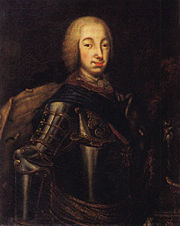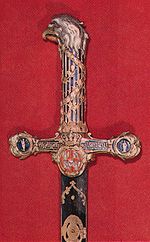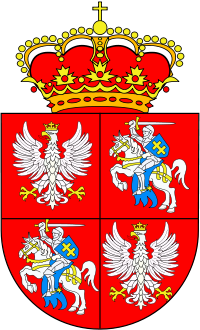Stanisław August Poniatowski
| Stanisław August Poniatowski | ||
|---|---|---|
| Born | January 17, 1732 | |
| in | Wołczyn, modern Belarus | |
| Died | February 12, 1798 (aged 66) | |
| in | Saint Petersburg, Russia | |
| Buried | St. John's Cathedral, Warsaw | |
| Coronation | November 25, 1764 in St. John's Cathedral, Warsaw |
|
| Family or dynasty | Poniatowski | |
| Coat of Arms | Ciołek. | |
| Parents | Stanisław Poniatowski Konstancja née Czartoryska |
|
| Marriage and children | with Elżbieta Szydłowska: Stanisław Grabowski, Izabela Grabowska, Aleksandra Grabowska |
|
| with Catherine II of Russia (informal): Anna Petrovna |
||
| with Magdalena Agnieszka Lubomirska (informal): Konstancja Zwanowa, Michał Cichocki |
||
|
Stanisław II August Poniatowski (born Count Stanisław Antoni Poniatowski; January 17, 1732 – February 12, 1798) was the last King and Grand Duke of the Polish-Lithuanian Commonwealth (1764–95). He was the son of Count Stanisław Poniatowski, Castellan of Kraków, and Princess Konstancja Czartoryska[1]; brother of Michał Jerzy Poniatowski, (1736 - Roman Catholic Primate Cardinal of Poland 1784 - 1794), Primate of Poland; and uncle to Prince Józef Poniatowski, (1763 - 1813).
Royal titles
(English translation, from the Polish text of the May 3, 1791, Constitution:) Stanisław August, by the grace of God and the will of the people King of Poland, Grand Duke of Lithuania and Duke of Ruthenia, Prussia, Masovia, Samogitia, Kiev, Volhynia, Podolia, Podlachia, Livonia, Smolensk, Severia and Chernihiv.
Biography

Poniatowski was born in 1732 at Wołczyn, Belarus. By the age of twenty, in 1752, as a Sejm deputy, Poniatowski had attracted attention with his oratory.
He ultimately owed his career, however, to his uncles and/or maternal grand parents , the powerful Czartoryski clan, who in 1755 sent him to Saint Petersburg, Russia, in the suite of the 47-year-old British ambassador, Sir Charles Hanbury-Williams, KB (8 December 1708 – 2 November 1759), a Welsh-born diplomat and satirist, son of John Hanbury, British ambassador in Dresden, Saxony, (1747 - 1750) and in Berlin, Prussia, (1750 - 1751).
There, through the influence of the Russian Empress Elizabeth, Russian Chancellor A. P. Bestuzhev-Ryumin, Poniatowski, aged 23, gained accreditation to the Russian court as ambassador of Saxony.
It happened that the elected King of Poland, named Augustus III of Poland,(Dresden, Saxony, 17 October 1696 - d. Dresden, Saxony, 5 October 1763), father in law of king Charles III of Spain, had been and was Elector of Saxony since 1733.
Through Hanbury-Williams who had been seating at a dinner function just in front of the German lady renamed as Catherine Alexeievna , formerly German born Sophie Friederike Auguste von Anhalt-Zerbst-Dornburg , he met married twenty-six-year-old, and future Empress Grand Duchess Catherine Alexeievna of Russia, (2 May [O.S. 21 April] 1729 – 17 November [O.S. 6 November] 1796) who reigned as Empress of Russia for 34 years, from 9 July [O.S. 28 June] 1762 until her death .
She was irresistibly attracted to the handsome and brilliant young Polish nobleman, for whom she forsook all other lovers. He was stolnik litewski in 1755 and later starosta przemyski.
The death in October 1763 of elected King Augustus III of Poland, known in Saxony as Elector Frederick Augustus II, who had been the inheritor in 1733, both in Saxony and in Poland - Lithuanian Kingdom of the Elector of Saxony and King of Poland known either as Augustus II the Strong; German: August II der Starke; Polish: August II Mocny; (12 May 1670 – 1 February 1733) a. k. a. as Frederick Augustus I, Elector of Saxony 1694-1733, later also King of Poland and Grand Duke of Lithuania 1697-1704 and again 1709-1733, opened interrogants about who should be the new elected King of Poland.

After a coup d'état with the blessings of former ennemy of Russia, who shaw Berlin occupied by Russian troops in 1760 under Russian Empress Elizabeth, (deceased January 1762), and then friendly after brief Tsar Peter III of Russia was recognized as a Czar but assasinated 6 months later, Friedrich II of Prussia,Frederick II (German: Friedrich II.; January 24, 1712 – King of Prussia 1740 - August 17, 1786), eager to share together Polish Lithuanian Kingdom territories led to Poniatowski grand parents on his mother side, , the Czartoryski Familia – supported by Russian troops – on September 7, 1764, to get 32 years old ambitious S. A. Poniatowski "elected" King of the Polish-Lithuanian Commonwealth.
By then, Prussian military discipline lover, Tsar Peter III of Russia, had been assasinated and his 35 year old German born Dowager Tsarine, now conveniently renamed as Russian Empress Catherine II of Russia received news about her former foreign diplomatic sweet heart S. A. Poniatowski becoming new King of the Poland - Lithuanian territories.
The formal coronation took place in Warsaw on November 25, 1764. The new King's uncles in the Familia would have preferred another nephew, Prince Adam Kazimierz Czartoryski, on the throne but A. K. Czartoryski had declined to seek the office.
Stanisław August - as he now styled himself - or "Ciołek", as he was deprecatingly called by some (after his Ciołek Coat of Arms) as King of the Polish-Lithuanian Commonwealth, remained at the mercy of circumstances.
Nevertheless, in his difficult situation he strove to do his duty. He inaugurated some useful economic changes. He supported the Familia's reform program until 1766, when he fell out with his uncles.
As a king, Poniatowski effectively supported the Russian army's crushing of the Bar Confederation, between 1768-1772. On October 22, 1770, the Council of the Bar Confederation proclaimed him dethroned. Poniatowski was briefly a prisoner after being kidnapped by members of the Confederation in 1771, and held outside of Warsaw.
Although he protested the first partition of the Commonwealth (1772), he was powerless to do anything about it, and in the face of implacable opposition from the Polish magnates, the counterparts of the again self important Russian Boyar´s families.
Neither Poniatowski, neither Catherine II could do much practical and/or social justice to the well crushed paysant serfs/"mujiks", however their good intentions, being friendly or careful readers of French Encyclopedists, be then Voltaire, Diderot, Maupertuis or Fréderic César de la Harpe for instance, as it has been proved by many historians over the years again and again.
The violent jacobine excesses of the French revolution as from 1789 would even lead to very much conservative political positions of the new burgeoisy in many European countries, (France itself, Russia, Austria - Hungary, Germanic States, Italy, Spain, Portugal, England, Poland "tied up" to Russia till 1918 or 123 years, etc.) well till no least than 1848 or even much later in many of these countries.
Moreover, S. A. Poniatowski was obliged to place his reliance in Russia's German ambassador, Otto Magnus von Stackelberg.
In 1783/1784 he married morganatically his lover Elżbieta Szydłowska (1748–1810), whose first husband Jan Jerzy Grabowski was general inspektor wojsk litewskich, and by whom he had an only son, born before marriage, Count Stanisław Konopnicy-Grabowski, (1780-Dresden, 1845).
"King" S. A. Poniatowski son married firstly Cecylia Dembowska (December 19, 1787-January 17, 1821), and secondly May 8, 1822 Countess Julia Zabiello; he left issue, his descendants were the Counts Konopnicy-Grabowski. Acting in concert with him, he hoped to strengthen his authority and bring about essential reforms.
It was only during the Four-Year Sejm of 1788-1792 that he threw in his lot with the reformers, centered in the Patriotic Party, and with them co-authored the Constitution of May 3, 1791.
Poniatowski's eloquent speech before the Sejm on taking an oath to uphold the newly adopted Constitution moved his audience to tears.
Shortly thereafter, the Targowica Confederation was formed by Polish nobility to overthrow the Constitution. The confederates aligned with Russia's Catherine the Great, and the Russian army entered Poland, starting the Polish-Russian War of 1792.
After a series of battles, Poniatowski, upon the advice of Hugo Kołłątaj and others, acceded to the Confederation. This undermined the operations of the Polish Army, which under Tadeusz Kościuszko and the King's own nephew, Prince Jozef Poniatowski, had been performing prodigiously on the battlefield.
The war was ended, and Russia and Prussia undertook the Second partition of Poland in 1793.

King Stanisław August remains a controversial figure. He was accused by some of striving for absolutism, of doing away with the liberties of the szlachta (Polish nobility), of desiring the downfall of the Roman Catholic Church; by others, of weakness and subservience, even of treason, especially after he had joined the Targowica Confederation.
Nevertheless, he did accomplish much in the realm of culture and education. He founded the School of Chivalry (otherwise "Corps of Cadets"), which functioned 1765-1794 and whose alumni included Tadeusz Kościuszko; and the Commission of National Education (1773), the world's first national ministry of education. In 1765 he helped found the Monitor, the leading periodical of the Polish Enlightenment, and the Polish national theater. He hosted his famous "Thursday dinners", the most brilliant social functions in the Polish capital. He supported the establishment of manufactures and the development of mining. He remodeled the Royal Castle in Warsaw, and erected the elegant Łazienki complex in Warsaw's most romantic park. He created a numismatic collection, a picture gallery, and an engravings room. His plan to create an even larger painting gallery in Warsaw was interrupted by the destruction of Poland; nonetheless, most of the paintings he had ordered can now be seen at the Dulwich Picture Gallery in London.
After the final, Third Partition of the Polish-Lithuanian Commonwealth, Stanisław August was forced to abdicate (November 25, 1795) and left for Saint Petersburg, Russia. There, a virtual prisoner, he subsisted on a pension from his former sweet heart Empress Catherine the Great, (deceased 1796, and died deeply in debt. He was buried at the Catholic Church of St. Catherine in St. Petersburg.
In 1938 his remains were transferred to a church at Wołczyn, his birthplace, and in 1995, to St. John's Cathedral in Warsaw, where, on May 3, 1791, he had celebrated the adoption of the Constitution he had co-authoredand/or endorsed.
Ancestors
| Ancestors of Stanisław August Poniatowski | ||||||||||||||||||||||||||||||||||||||||||||||||||||||||||||||||||||||||||||||||||||||||||||||||||||||||||||||||||||||||||||||||||||||||||||||||||||||||||||||||||||||||||||||||||||||||||||||||||||||||||||||||||||||||||||||||||||||||||||||||||||||||||||||||||||||||||||||||||||||||||||||||||||||||||||||||||||||||||||||||||||||||||||||||||||||||||||||||||||||||||||||||||||||||||||||||||||||
|---|---|---|---|---|---|---|---|---|---|---|---|---|---|---|---|---|---|---|---|---|---|---|---|---|---|---|---|---|---|---|---|---|---|---|---|---|---|---|---|---|---|---|---|---|---|---|---|---|---|---|---|---|---|---|---|---|---|---|---|---|---|---|---|---|---|---|---|---|---|---|---|---|---|---|---|---|---|---|---|---|---|---|---|---|---|---|---|---|---|---|---|---|---|---|---|---|---|---|---|---|---|---|---|---|---|---|---|---|---|---|---|---|---|---|---|---|---|---|---|---|---|---|---|---|---|---|---|---|---|---|---|---|---|---|---|---|---|---|---|---|---|---|---|---|---|---|---|---|---|---|---|---|---|---|---|---|---|---|---|---|---|---|---|---|---|---|---|---|---|---|---|---|---|---|---|---|---|---|---|---|---|---|---|---|---|---|---|---|---|---|---|---|---|---|---|---|---|---|---|---|---|---|---|---|---|---|---|---|---|---|---|---|---|---|---|---|---|---|---|---|---|---|---|---|---|---|---|---|---|---|---|---|---|---|---|---|---|---|---|---|---|---|---|---|---|---|---|---|---|---|---|---|---|---|---|---|---|---|---|---|---|---|---|---|---|---|---|---|---|---|---|---|---|---|---|---|---|---|---|---|---|---|---|---|---|---|---|---|---|---|---|---|---|---|---|---|---|---|---|---|---|---|---|---|---|---|---|---|---|---|---|---|---|---|---|---|---|---|---|---|---|---|---|---|---|---|---|---|---|---|---|---|---|---|---|---|---|---|---|---|---|---|---|---|---|---|---|---|---|---|---|---|---|---|---|---|---|---|---|---|---|---|---|---|---|---|---|---|---|---|---|---|---|---|---|---|---|---|---|---|---|---|---|---|---|---|---|---|---|---|
|
||||||||||||||||||||||||||||||||||||||||||||||||||||||||||||||||||||||||||||||||||||||||||||||||||||||||||||||||||||||||||||||||||||||||||||||||||||||||||||||||||||||||||||||||||||||||||||||||||||||||||||||||||||||||||||||||||||||||||||||||||||||||||||||||||||||||||||||||||||||||||||||||||||||||||||||||||||||||||||||||||||||||||||||||||||||||||||||||||||||||||||||||||||||||||||||||||||||
Patronage
References
- ↑ According to a contemporary statement, his father Stanisław was in reality a natural son of Great Lithuanian Hetman Kazimierz Jan Sapieha by an unknown Jewish maiden, adopted by Franciszek Poniatowski; Jerzy Łojek, Dzieje zdrajcy, Katowice, 1988, ISBN 83-216-0759-4, p. 189.
- ↑ (English) "Stolen Kiss". hermitagemuseum.org (2003). Retrieved on 2008-02-21.
- Jan Kibinski, Recollections of the Times of Stanislaw Augustus (Polish), Kraków, 1899.
- Mémoires secrets et inédits de Stanislas Auguste, Leipzig, 1862.
- Stanislaw and Prince Joseph Poniatowski in the Light of Their Private Correspondence, in French, edited in Polish by Bronislaw Dembinski, L'viv, 1904.
- R.N. Bain, The Last King of Poland and His Contemporaries, 1909.
- Adam Zamoyski, The Polish Way: a Thousand-Year History of the Poles and Their Culture, New York, Hippocrene Books, 1994.
- Adam Zamoyski, Last King of Poland, New York, Hippocrene Books, 1997.
- Poniatowski's diaries and letters, held for many years in the Russian ministry of foreign affairs, appeared in the January 1908 Vestnik Evropy [News of Europe].
- http://en.wikipedia.org/wiki/Familia
See also
- Ambassadors and envoys from Russia to Poland (1763–1794)
- History of Poland (1569-1795)
- History of philosophy in Poland
- Elena Poniatowska, direct descendant living in Mexico
- Kazimierzowski Palace
- Łazienki Park
- St. Anne's Church, Warsaw
- Royal Castle, Warsaw
- sources in Polish
External links
|
Stanisław August Poniatowski
House of Poniatowski
Born: 17 January 1732 Died: 12 February 1798 |
||
| Regnal titles | ||
|---|---|---|
| Preceded by August III the Saxon |
King of Poland 1764-1795  |
Succeeded by None (Poland partitioned). |
|
||||||||||||||||||||||||||
|
|||||||||||
|
||||||||||||||||||||||||||||||||||||||||||||||||||||||||||||||||||||||||||||||||||||||||||||||||||||||||||||||||||
This article incorporates text from the Encyclopædia Britannica Eleventh Edition, a publication now in the public domain.
| Persondata | |
|---|---|
| NAME | Poniatowski, Stanisław August |
| ALTERNATIVE NAMES | Poniatowski, Stanisław Antoni |
| SHORT DESCRIPTION | King of Poland |
| DATE OF BIRTH | January 17, 1732 |
| PLACE OF BIRTH | Wołczyn, Poland |
| DATE OF DEATH | February 12, 1798 |
| PLACE OF DEATH | Saint Petersburg, Russia |